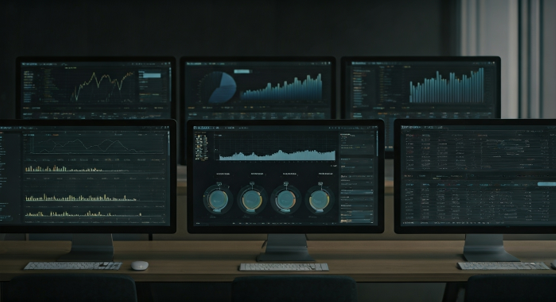Comprehensive Guide to Energy Data Management Solutions
Comprehensive Guide to Energy Data Management Solutions

Key Highlights
- Energy data management is important for energy efficiency and being more sustainable. It helps people make better choices by giving them the facts from well-organized data collection and looking at that data the right way.
- With this, you can use less energy, spend less money, and meet rules and laws that are set in different fields.
- There are now cloud-based EDM solutions that can handle data in real time, do analytics, and help with reporting and storage. These help energy companies and others, too.
- EDM systems make a company work better, help lower energy use, and get a business closer to meeting its sustainability goals.
- When EDM is used together with maintenance management software, it helps improve workflows. This lets people fix problems before they get big and make sure things get better over time.
Let's now talk about what energy data management is all about and why it's done.
Introduction
In today’s world, the way we manage energy data is a central aspect of energy management that is very important for any business that wants to be more eco-friendly and save money, having a significant impact on the company’s bottom line. Data management helps a lot here. It means taking in, checking, and using all the energy data to help control how much power you use and follow all the rules in this area. When you use strong EDM tools, you make it easier to deal with things like changing energy usage and keeping up with regulatory compliance. This also helps you make better choices and save money when you run your business.
To see why this really matters, let’s look at what energy data management solutions have to offer.
Understanding Energy Data Management Solutions

Energy data management solutions are important tools in the energy industry, which keeps changing all the time. These solutions help match up energy usage with company goals and plans for money and daily work. Companies use EDM systems to gather and look at energy data in an organized way. This helps them use energy better and supports goals for sustainability.
With cloud-based technology, these systems set up a flexible way to check data and use analytics in real time. These tools do not just boost energy efficiency. They also help businesses follow the rules and laws in place. Now, let’s go deeper into some main ideas and terms in energy data.
Key Concepts and Definitions
Energy data management is about collecting, looking at, and making sense of energy data. This is the main part of energy management. The way you handle this data helps your company use less energy, save money, and reach its goals for sustainability. The interpretation of energy data matters a lot. It turns hard-to-read numbers into ideas you can use to make good choices.
EDM works best when there are strong systems in place. These systems help store, check, and report big data sets. Cloud-based tools, mixed with things like AI, make analytics better and help you plan for what's next. They help you see how much energy you use and plan for the future.
Energy data management also covers areas like looking after invoices, making sure things are balanced, and following rules from all over the world. This means EDM is very important for how businesses work. Next, we will look at the different types of energy data that are collected and what this means for everyone.
Types of Energy Data Collected
Energy data management involves the collection of diverse data points critical for optimising energy usage and equipment performance. These datasets help organisations monitor and refine consumption patterns for improved operational efficiency.
The primary categories of energy data include equipment-related metrics, energy usage figures, and tracking of peak demand times. By utilising sensors and advanced systems, companies accurately gather detailed insights into energy operations across sectors.
| Type of Energy | Description |
|---|---|
| Energy Usage | Energy Usage Real-time consumption patterns and peak usage periods |
| Equipment Performance | Operational efficiency and maintenance requirements |
| Meter Readings | Data from electricity, gas, heating, and water usage |
| Pricing Data | Energy cost per unit tracking for budget optimization |
Let’s now explore the remarkable benefits offered by implementing EDM solutions.
Benefits of Implementing Energy Data Management
Adding energy data management to business processes brings clear benefits. EDM solutions help improve how things work and cut extra costs. They let you track energy use closely and make better decisions.
These systems also help companies reach their sustainability goals. They give you the insights to keep energy use low and cut your carbon footprint. You save money and take care of the environment at the same time, so EDM is now a must-have for modern companies. Let's look at how these EDM tools help with operational efficiency and staying in line with regulations.
Operational Efficiency and Cost Savings
Energy data management helps make workflows better and can lead to real savings on costs and better operational efficiency. This way, organisations can make the most of their energy use and work to stop wasting it.
- Real-time data lets you change how your equipment runs so you can save on energy.
- Automation tools help keep workflows smooth. They cut out a lot of manual work and can make people more productive.
- Predictive analytics look ahead to find where energy might be used in the wrong way, so you can fix things before they become a bigger problem.
- Optimisation keeps energy costs in check, helping you make more money over time.
When you use these ways of managing energy data, your organisation can spend less without losing out on what it does. On top of that, energy data management (EDM) helps with regulatory compliance and meeting sustainability goals.
Regulatory Compliance and Sustainability
One big benefit of using energy data management systems is that they help keep companies in line with rules. Many rules in the energy industry ask for clear reports and less energy use. EDM helps companies follow these rules, so they do not get fined.
A focus on sustainability also comes with tracking real-time energy use and emissions. When companies have this information, they can make plans that help lower their carbon footprint and build a better, greener image.
When a company uses best practices in its workflows, EDM makes operations more clear and open. It helps organisations hit both compliance and environmental targets with ease. This is why EDM is so important in the energy industry right now. To sum up, data management has a wide impact on businesses by supporting both good practices and stronger results.
Conclusion
Energy Data Management Solutions are very important when you want to get the most out of your energy use. These systems help your business use less energy and support better ways to protect the planet. When you set up energy data management, you and your team can see your energy usage clearly. This helps you boost your operational efficiency and save money, too. These days, following the rules around energy is a must. Having strong data management for your energy data will keep you in line with laws and will also show that you care about sustainability. Learning more about the types of data you collect and the key benefits of these solutions will help you and your people make good decisions. If you want to know how energy data management can bring new changes to your company, schedule a free consultation today.
Frequently Asked Questions
What is energy data management?
Energy data management is about how a company collects, checks, and understands energy data. This process helps a company find ways to use less energy, save money, and improve how it works. With the help of analytics, companies can make better choices. This is important for good energy management and for company goals about sustainability. It also helps control energy consumption in the long run.
How do energy data management solutions support sustainability goals?
EDM helps companies with sustainability in a few key ways. It gives detailed insights about energy consumption and energy usage. With this information, companies can see where they use energy and how to use less of it. They can also make their work better by cutting down on waste. All of this helps to lower carbon from what they do and keep their energy use in line with eco-friendly goals. EDM is a good tool to make work more sustainable for everyone.
What are the key features to look for in an energy data management system?
Key features of the system are data accuracy, easy-to-use analytics, strong security steps, and the ability to grow as needed. These parts make sure you get the right numbers, store things in a safe way, and get helpful ideas. This is very important for good energy management. It also helps you meet rules and reach your everyday work goals.
How can companies ensure data accuracy and security?
Using best practices like real-time monitoring, strong software tools, and transparency helps keep energy data safe and reliable. When you add in checks to make sure the data is correct, you can also make sure it stays accurate and secure all the time.
Is energy data management suitable for small businesses?
Yes, that’s right. Energy Data Management (EDM) helps to boost energy efficiency. It leads to lower costs and supports cost reduction over time. EDM also supports efforts to be sustainable, which is good for any business, big or small. These scalable solutions are built to fit your needs. This makes EDM a practical choice for companies of any size.



